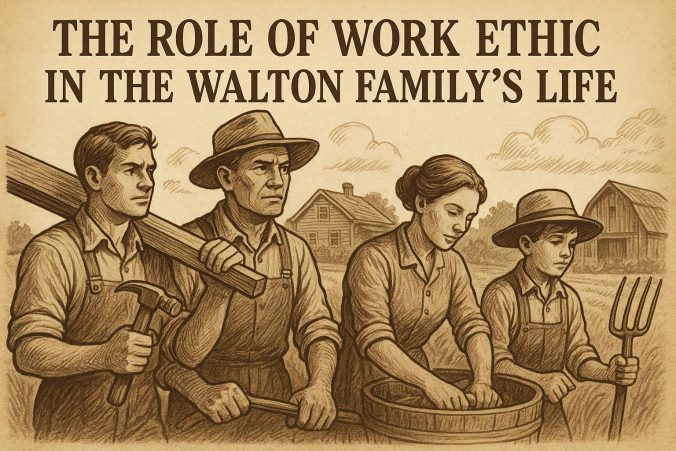The Walton Family’s Work Ethic
The Walton family is globally recognized primarily due to their association with Walmart, the world’s largest retailer. The foundational success and ongoing growth of Walmart are heavily influenced by the work ethic instilled by its founder, Sam Walton. His approach to business, characterized by hard work and unwavering dedication, continues to impact the way the Walton family operates both professionally and personally.
Sam Walton’s Approach to Work
Sam Walton founded Walmart in 1962 with a vision to bring affordable goods to small-town America. This vision was fueled by a strong work ethic, which emphasized innovation, frugality, and a hands-on approach to business operations. Walton often shared that a deep commitment to work was crucial for achieving big goals. His philosophy was rooted in the belief that a dedicated work ethic could overcome various challenges in the competitive retail industry. Through perseverance and consistent effort, Walton built a retail empire that reshaped consumer habits and expectations.
Sam Walton’s work ethic was not merely an abstract ideology but a practical tool that he employed in every aspect of his business. His daily routine, constructive interactions with employees, and forward-thinking strategies were all indicative of the seriousness with which he approached the company. By maintaining a presence on the sales floor and routinely engaging with staff and customers alike, Walton gathered firsthand insights that informed his business strategies. This energetic involvement was a hallmark of his leadership style and set a precedent for future operations at Walmart.
Principles of Hard Work in Walmart
Several principles strongly defined Walton’s work ethic at Walmart:
Customer-Centric Focus: Walton’s philosophy revolved around the customer. He believed in understanding and prioritizing customer needs, which meant working tirelessly to offer the best prices and service. Walton maintained that listening to customers could lead to significant business improvements, a belief that continues to shape Walmart’s approach to customer relations today. Walmart’s success in continually offering competitive prices and quality service is a testament to this foundational principle.
Innovation and Adaptability: A staunch advocate for progress, Walton embraced new technologies and strategies to ensure Walmart stayed ahead of competitors. This adaptability was only possible through a diligent approach to work. By investing in technology and infrastructure, Walmart revolutionized supply chain management and inventory systems, continuously refining their operations to improve efficiency and reduce costs. Walton’s emphasis on adaptability ensured that Walmart could navigate market fluctuations and consumer trends.
Employee Empowerment: Walton understood the value of a motivated workforce. His management style encouraged both employees and managers to voice ideas and improvements, promoting a hardworking environment at every level of the company. By fostering an inclusive atmosphere where employees felt valued and heard, Walton cultivated a culture of innovation and commitment. This empowered workforce became a driving force behind Walmart’s success, as employees were motivated to contribute actively to the company’s goals.
The Walton Family’s Continued Legacy
The commitment to a strong work ethic did not end with Sam Walton. His children and relatives, many of whom have been involved with Walmart in various capacities, continue to adhere to the work-centric ideals he championed. This legacy is evident in how the family manages their business interests and philanthropic endeavors. The Walton family has played a significant role in ensuring that the core values set forth by Sam Walton are maintained and adapted to current business landscapes.
The Walton Family Foundation actively pursues educational, environmental, and community initiatives with a hands-on approach, driven by the same principles of hard work and dedication to impactful outcomes. This foundation reflects the family’s commitment to using their resources to create meaningful change in society. By applying their work ethic to philanthropic activities, the family ensures that their efforts lead to sustainable and significant impacts. This proactive approach speaks to the foundational belief in hard work as a means of achieving tangible results, an ethic that permeates their professional and personal lives.
Moreover, the family’s ongoing involvement with Walmart keeps the company aligned with the values and vision of its founder. The Waltons play an integral role in strategic decision-making at Walmart, maintaining a hands-on approach that reflects their commitment to the company’s success and its foundational principles.
Conclusion
The Walton family exemplifies the role of a robust work ethic in achieving and sustaining extraordinary success. Their story is not simply about wealth but the disciplined effort and ethical framework that have propelled and maintained Walmart and other ventures. By adhering to the principles set by Sam Walton, the family continues to influence the retail landscape significantly. They demonstrate that dedication, innovation, and customer-focused strategies are integral to a thriving business.
The narrative of the Walton family serves as an enduring example of how hard work, when married with strategic vision and ethical practices, can lead to phenomenal achievements. Their legacy is deeply enshrined in the values they uphold and in their ongoing efforts to apply these values to both business and broader societal contexts. Thus, understanding the Waltons’ commitment to their work offers valuable insights into the dynamics of leading successful initiatives and enterprises.
To understand more about the influence of their work ethic on Walmart and beyond, further information can be explored through various credible resources such as business articles from Bloomberg or Forbes.


